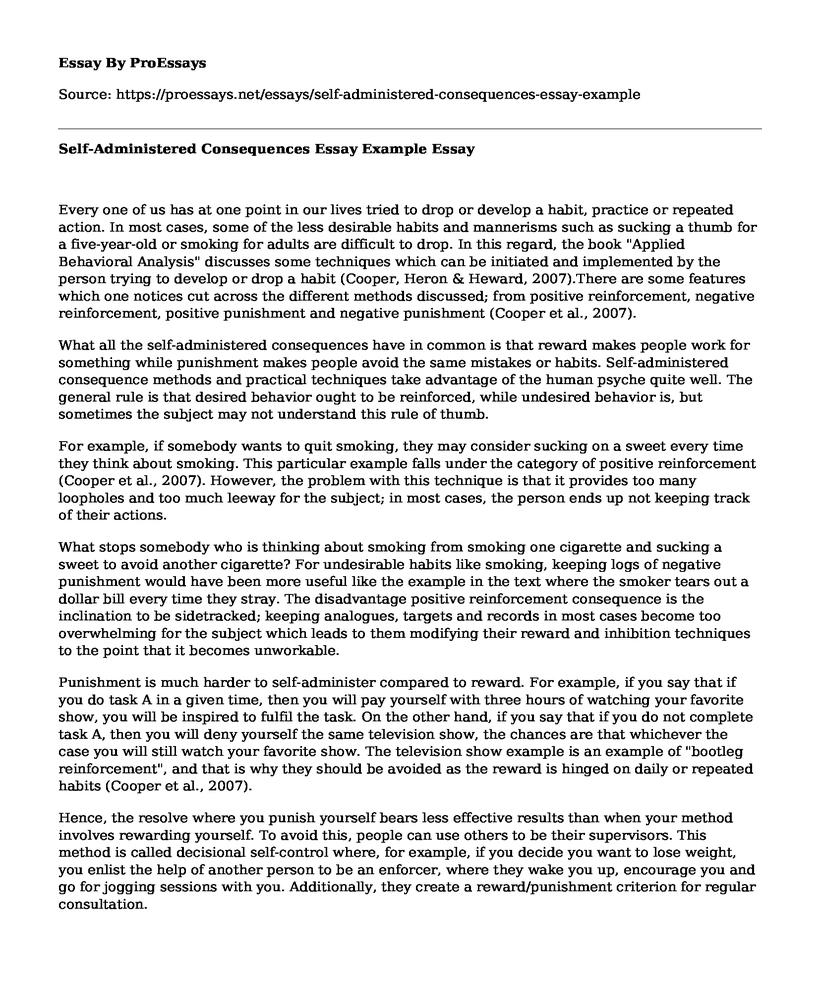Every one of us has at one point in our lives tried to drop or develop a habit, practice or repeated action. In most cases, some of the less desirable habits and mannerisms such as sucking a thumb for a five-year-old or smoking for adults are difficult to drop. In this regard, the book "Applied Behavioral Analysis" discusses some techniques which can be initiated and implemented by the person trying to develop or drop a habit (Cooper, Heron & Heward, 2007).There are some features which one notices cut across the different methods discussed; from positive reinforcement, negative reinforcement, positive punishment and negative punishment (Cooper et al., 2007).
What all the self-administered consequences have in common is that reward makes people work for something while punishment makes people avoid the same mistakes or habits. Self-administered consequence methods and practical techniques take advantage of the human psyche quite well. The general rule is that desired behavior ought to be reinforced, while undesired behavior is, but sometimes the subject may not understand this rule of thumb.
For example, if somebody wants to quit smoking, they may consider sucking on a sweet every time they think about smoking. This particular example falls under the category of positive reinforcement (Cooper et al., 2007). However, the problem with this technique is that it provides too many loopholes and too much leeway for the subject; in most cases, the person ends up not keeping track of their actions.
What stops somebody who is thinking about smoking from smoking one cigarette and sucking a sweet to avoid another cigarette? For undesirable habits like smoking, keeping logs of negative punishment would have been more useful like the example in the text where the smoker tears out a dollar bill every time they stray. The disadvantage positive reinforcement consequence is the inclination to be sidetracked; keeping analogues, targets and records in most cases become too overwhelming for the subject which leads to them modifying their reward and inhibition techniques to the point that it becomes unworkable.
Punishment is much harder to self-administer compared to reward. For example, if you say that if you do task A in a given time, then you will pay yourself with three hours of watching your favorite show, you will be inspired to fulfil the task. On the other hand, if you say that if you do not complete task A, then you will deny yourself the same television show, the chances are that whichever the case you will still watch your favorite show. The television show example is an example of "bootleg reinforcement", and that is why they should be avoided as the reward is hinged on daily or repeated habits (Cooper et al., 2007).
Hence, the resolve where you punish yourself bears less effective results than when your method involves rewarding yourself. To avoid this, people can use others to be their supervisors. This method is called decisional self-control where, for example, if you decide you want to lose weight, you enlist the help of another person to be an enforcer, where they wake you up, encourage you and go for jogging sessions with you. Additionally, they create a reward/punishment criterion for regular consultation.
Conclusion
Practically, it seems that self-consequences are best carried out with the help of others. The resolve and decision should come from the subject but enforced by others who are stricter than the subject person. The consequences should develop step by step, simple procedures and the targets should be reasonable (Cooper et al., 2007). People should also avoid "bootleg reinforcement" and keep records of what they are doing, goals and actual results for purposes of comparison. Self-administered consequences work when followed religiously, but the subject should also consider personal modifications and setting limits beyond the suggested textbook techniques.
Reference
Cooper, John O., Heron, Timothy E. Heward, William L. (2007). Applied behavior analysis /Upper Saddle River, N.J. : Pearson/Merrill-Prentice Hall, New International Edition
Cite this page
Self-Administered Consequences Essay Example. (2022, Aug 30). Retrieved from https://proessays.net/essays/self-administered-consequences-essay-example
If you are the original author of this essay and no longer wish to have it published on the ProEssays website, please click below to request its removal:
- Essay Sample on Hyperthymesia
- Anxiety and OCD Essay Example
- Essay on Staff Burnout & Compassion Fatigue: Study at Heartland Behavioral Healthcare
- Essay Example on Winning Arguments in Relationships
- Annotated Bibliography: Organizational Culture, Burnout, Bullying, and Nurse Turnover Intention
- Paper Example on Public Attitudes Towards Homelessness and Mental Illness
- Paper Example on CBT: Overcoming Challenges to Achieve Goals







